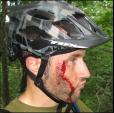
Interéssant...
4 message(s)
• Page 1 sur 1
Interéssant...

At a recent convention in which high brow academicians presented papers on "gene polymorphism" and "contralateral low-load force sense deficits," Joel Stager delivered a discourse on chocolate milk.
Stager's conclusion? Milk is a great way to recover from a tough workout.
"Many people assume an athlete's body gets more fit during exercise, but research shows it gets fit during the recovery process after exercise - allowing for future enhanced performance," Stager said. "We found that one of the greatest things athletes can do for themselves a half hour to an hour following exercise is drink chocolate milk."
Stager is not a shill for the American Dairy Association. He's director of the Counsilman Center within Indiana University 's Department of Kinesiology, as well as an avid swimmer and mountaineer.
When he delivered his talk last month at the 51st annual American College of Sport Medicine Conference in Indianapolis , the room was packed.
"I was shocked," said Stager. "You can do very sophisticated research and a half-dozen people will show up to hear you give a talk. This was incredible.
"People stayed for two hours afterward asking questions."
Stager's decision to test chocolate milk was born two years ago, when he was an assistant coach with the Bloomington High School South boys' and girls' swimming teams.
During the team's two-a-day workouts, he noticed the swimmers had difficulty recovering from their grueling morning workouts - resulting in slower times during the afternoon sessions.
"This was very significant," he said. "Being able to recover is paramount to being able to perform in subsequent workouts and ultimately improve performance."
By chance, Stager read an article about a synthetic product that claimed to enhance athletes' ability to perform in subsequent workouts.
"I bought a bottle, looked at the ingredients, and said to myself, 'This sounds very familiar,'" he said. "I took it to the grocery store and grabbed a carton of chocolate milk. It contained pretty much the same stuff as the synthetic product."
Stager asked the swimmers' parents to bring four gallons of whole chocolate milk to every morning practice session.
"We had each kid drink 12 to 16 ounces of chocolate milk after each morning practice," he said. "They didn't complain; they liked it."
Stager says the results were remarkable.
"Their ability to train in the afternoon with less fatigue vastly improved," he said. "The number of infections and illnesses also went down."
Encouraged by the results, Stager and his colleagues brought cyclists into their lab last summer and had them perform controlled exercise to the point of exhaustion.
"We gave them synthetic sports recovery products and chocolate milk," he said. "Then we exercised them four hours later and found that chocolate milk was nearly twice as effective than the synthetic products as a recovery product - and the athletes liked the taste a lot better."
But why chocolate milk instead of plain milk? Because it contains more carbohydrates.
"The latest research shows athletes ideally need a carbohydrates-to-protein ratio of 3-to-1 or 4-to-1," he said. Chocolate milk has that ratio; unflavored milk doesn't.
"Athletes can't perform on a low-carbohydrate diet," he said. "There are 30 years of research showing that carbohydrates are the preferred fuel source for muscles."
While Stager doesn't have much good to say about commercial sports drinks, he said those companies conducted research during the past 25 years that has paved the way for significant advances in sports nutrition.
One of their key findings, he said, is the importance of a "meal" within a half hour to an hour after a practice session.
"This post-exercise meal enables the athlete to recover and perform well again later that day or the following day," Stager said. "This small window is critical for putting fuel sources back inside the muscles, because that is the time at which the muscles' recovery rate is the highest."
For athletes who don't care for chocolate milk, Stager offers an alternative fuel source - milkshakes.
"About 10 years ago, an IU basketball player told me he was having a hard time recovering after practice in time for the games," he said. "I told him to run over to White Mountain after practice and buy the biggest milkshake he could afford. He told me two weeks later it was making a huge difference in his performance."
L'expérience,quelle chose magnifique,ca te permet de reconnaitre une gaffe quand tu la fait de nouveau...
-
dero - Jedi de la pédale
- Message(s) : 1072
- Inscription : Mar Fév 17, 2004 11:34 am
- Localisation : au pays du 613...
- Mon Vélo::
- Mon Vélo #2::
J'avais déjà entendu parler du (un liquide réhydratant qu'on donne aux enfants après qu'ils aient vomis ou faits de la diharée) comme boisson énergisante, mais jamais du lait au chocolat.
-= Ahuntsic Squad (Membre honoraire) =-
-

Bryston - Site Admin
- Message(s) : 1750
- Inscription : Lun Août 08, 2005 8:58 am
- Localisation : St-Lambert
- Mon Vélo::
- Mon Vélo Fat::
- Mon Vélo #2::
-

Evil Sylvain - Jedi de la pédale
- Message(s) : 2301
- Inscription : Sam Juil 17, 2004 12:01 pm
- Localisation : Lachine
- Mon Vélo::
- Mon Vélo Fat::
- Mon Vélo #2::
- Mon Vélo #3::
4 message(s)
• Page 1 sur 1
Qui est en ligne ?
Utilisateur(s) parcourant ce forum : Aucun utilisateur inscrit et 1 invité
Copyright © 2020 | MH Purity WordPress Theme by MH Themes
